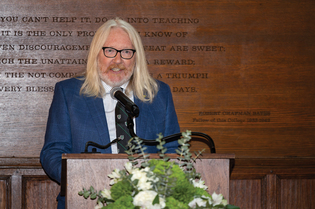
Allie Barton
Sterling Professor W. Mark Saltzman decided not to become a doctor, but his work creates medical breakthroughs.
View full image
Biomedical engineering professor W. Mark Saltzman has made news twice at Yale this year: first, in March, when he was named head of Jonathan Edwards College, reprising a role he held from 2016 to 2022; and again in July when he was appointed a Sterling Professor, the university’s highest faculty honor.
It’s a long way for a man whose grandfather, born in southern Iowa, had to abandon his college studies in civil engineering when he was called back to the family farm during the Great Depression. “He was, in many ways, a frustrated engineer,” says Saltzman, who counts his grandfather as one of his two greatest professional influences. “I heard that story growing up. I’m sure that’s some of where my interest first came from.”
But Saltzman himself began college as a premed student. “My mother always wanted me to be a doctor,” he says. He volunteered in a hospital as an undergrad. He tried to love the work, but didn’t. At the end of his junior year at Iowa State University, he heard a professor named Richard Seagrave outline how the tools and principles of his discipline—chemical engineering—might illuminate the workings of the human body and advance medical science. The dialysis machine, Seagrave noted, is an artificial kidney constructed with this approach. “I became really fascinated by the idea,” Saltzman says.
He majored in chemical engineering and went on to complete his PhD in medical engineering at MIT. After teaching for nine years at Johns Hopkins University and six at Cornell, he was hired by Yale in 2002 as the Goizueta Foundation Professor of Chemical and Biomedical Engineering and founding chair of the biomedical engineering department.
The Sterling professorship, which can be held by as many as 40 active professors, in part recognizes Saltzman’s tremendous imprint as a teacher and mentor: he earned Yale’s Sheffield Teaching Prize for excellence in the classroom in 2009, and he was an admired head of college in his first term at Jonathan Edwards, a position he describes as “the best professional experience I’ve ever had.”
Saltzman’s promotion also recognizes his wide-ranging contributions to the world of medicine. Of late, he and colleagues at the School of Medicine have been focused on novel gene-editing therapies for cystic fibrosis and beta thalassemia, along with nonsurgical approaches to treating skin cancer. Saltzman was also part of a team that was instrumental in developing a Covid vaccine that could be inhaled rather than injected. The technology is being developed for widespread vaccine use.
“Mark does absolutely wonderful research on drug delivery and tissue engineering; he is one of the top biomedical engineers in the world,” says Robert Langer, Saltzman’s PhD adviser at MIT (and his other greatest professional influence). “He is one of the nicest, smartest, most decent people you’ll ever meet.”
 loading
loading